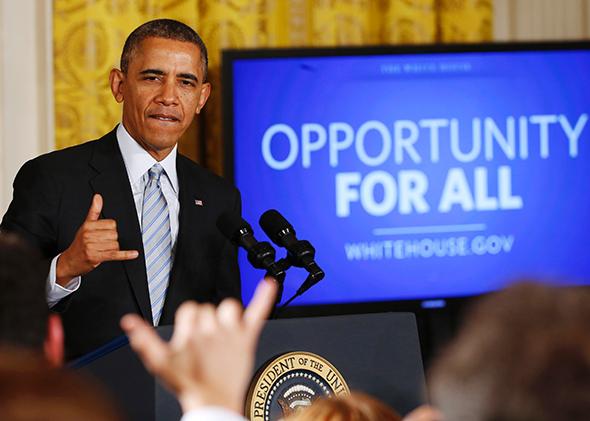If you are a member of the 1 percent, be wary, the politicians are coming for you. They’d like a donation to their campaign. Given all the talk about income inequality, you might have worried that they’d be supporting policies that could hurt you. Rest easy: Control of the Senate hangs in the balance this election year and the political system needs your donations more than your hide. Pollsters and strategists are telling candidates that targeting the rich or talking too much about income inequality isn’t a smart strategy. So you’re not even likely to receive a righteous rhetorical scapegoating. History suggests you’ve dodged a bullet, too. Today’s popular ferment for change is small by historical comparison.
Proof of how gently politicians are treating the wealthy was on display last week when President Obama spoke to the Democratic National Committee. The president has said that addressing income inequality will be the centerpiece of his remaining time in office, but when the president spoke to the DNC, he didn’t mention income inequality at all. Democrats support “opportunity for all,” he said, whereas Republicans support “opportunity for a few.” Dropping the word inequality—which is about disparity of outcomes—shifts the conversation away from the wealthy who are enjoying those outcomes. The president has also changed the target of his political jabs. He is attacking Republicans now, but in 2012 the president talked relentlessly about a country in which everyone had a “fair shake and did their fair share.” Who, according to the president, wasn’t doing their fair share? The wealthy, because of the way they were shielded by the tax code.
It’s not just the president who has removed hints of class warfare from his language. Democratic candidates are being coached to do this, too. Polls consistently show that Americans of both parties believe that income inequality exists and that it is a problem, but as Democratic pollster Mark Mellman explains, when you ask voters to rank “income inequality” among other issues, only 1 percent say it is a priority. “The polling imperative is to make sure you’re attacking opportunity inequality, not income inequality,” says one veteran Democratic strategist. “Obviously, one creates the other. But the public sees a distinction. One seems American. The other, Communist.”
Voters are more likely to back specific items that address inequality, like raising the minimum wage, extending unemployment insurance, or ensuring equal pay for women. These are the kinds of policies the president and Democrats are pushing, but none of those items actually represent a broad attack on the wealthy. The limits of this agenda are why Jason Furman, chairman of the White House Council of Economic Advisers, recently said that the 1 percent’s fears that they are under assault were “just hyperventilation around not paying attention to specific facts and data.”
Politicians can be trusted to seize on a popular notion that will help them get re-elected, particularly if that notion stirs anger and envy, emotions that propel people to the polls. If class warfare were the big Democratic idea, we’d see it dripping from every ad and speech. Look, for example, at how Republicans use House Minority Leader Nancy Pelosi in political advertising. It’s not subtle. Republicans are hanging her on any Democrat they can find. Nevertheless, to some, like Rep. Paul Ryan, the president’s toned-down rhetoric is just a sleight of hand. The president is still focused on redistributing wealth and stoking class warfare, Ryan recently told CNBC. Ryan has plenty he can point to. For years the president has been talking about the unfair breaks that go to millionaires and billionaires. Also, the president’s budget released on Tuesday is designed to highlight trade-offs that define Republicans as the party of the wealthy and not the middle class. The budget includes a provision that would pay for the expansion of the Earned Income Tax Credit and child tax credit—programs that benefit low-income and middle-income Americans—through the elimination of loopholes that benefit the wealthy, including the “carried interest” tax loophole, which allows private equity and venture capital executives to treat such income at a lower tax rate.
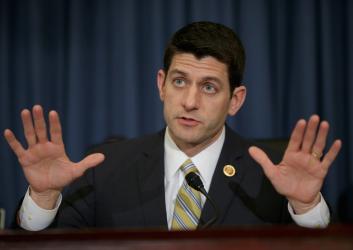
Photo by Chip Somodevilla/Getty Images
This budget is a purely political document, and will never become law. Ryan and his House colleagues offer a firewall against whatever the president might be plotting in the White House basement. No tax increases on the wealthy are going to pass on their watch, but that is no comfort to some on the heated driveway side of the gated community. For some conservatives, the very mention of “income inequality” means pitting one class against the other. That’s why during the last presidential campaign Mitt Romney said the issue of income inequality should only be discussed in “quiet rooms.” Venture capitalist giant Tom Perkins is certainly spooked. He famously compared progressives and their “rising tide of hatred” of the 1 percent to the Nazi extermination of the Jews. He wasn’t the first to see a Reich around the corner. In 2010, Stephen A. Schwarzman, founder of Blackstone said that Obama’s proposal to tax “carried interest”—a big source of income for private-equity managers—reminded him of “when Hitler invaded Poland in 1939.”
These comparisons are not just loony, they’re also a waste of historical analogy miles. There’s obviously an increase in sentiment against the rich—polls show a modest increase in those who believe the wealthy unfairly benefit from the current economic system—but you don’t have to travel all the way to Nazi Germany to see whether today matches the past. There are several periods in American history—the Populist, Progressive, and New Deal eras—when the rich were on the run.
Today’s wealthy face nothing approaching what their predecessors did. “The 1 percent should count themselves lucky,” says Yale historian Beverly Gage. “If this were the turn of the century, they would be afraid of bomb-throwing anarchists.” Gage is the author of The Day Wall Street Exploded about the largest terrorist attack on American soil before the Oklahoma City bombing. (Editor’s note: She’s also an occasional contributer to Slate.) That was just one of the violent acts that sprung from ideological, class-based violence at the turn of the 20th century. In 1892, Henry Clay Frick was shot three times and stabbed during a steel strike. John D. Rockefeller and executives of Standard Oil faced several bomb plots. Labor unions tried to redress the imbalances with crippling work stoppages like the Pullman strike and the Homestead strike. Ironworkers were engaged in a multiyear bombing campaign that culminated in the destruction of the Los Angeles Times building in 1910.
Compare that level of action with Occupy Wall Street, which so frightened Perkins. The movement managed to take over some parks and irritate some people with its drumming. It did change the public conversation but still never achieved anything near the influence of the Tea Party, the other grass-roots movement of the age, which is responsible for changing control of the House and reshaping American politics for the past five years.
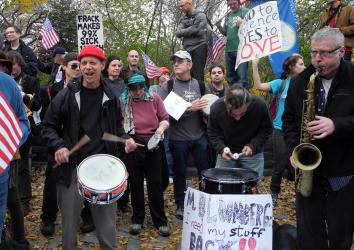
Photo by Brigitte Dusseau/AFP/Getty Images
President Obama’s rhetoric, even before its recent watering down, has never approached the level of his predecessors. The starkest example of this was the president’s speech in Osawatomie, Kan., which was designed to echo the one Teddy Roosevelt gave at the same location a century earlier. In the president’s 2011 speech, and the one he gave last December in Washington, which was meant to echo its themes, Obama never came close to the wealth bashing of Roosevelt’s original. T. R. raged against “a small class of enormously wealthy and economically powerful men, whose chief object is to hold and increase their power” and said government’s “prime need is to change the conditions which enable these men to accumulate power which it is not for the general welfare that they should hold or exercise.”
Roosevelt, who coined the phrase “malefactors of great wealth,” was campaigning in support of the graduated income tax and the estate tax on the theory that without them a moneyed royalty would rise, a direct threat to a functioning democracy. Twenty years later, FDR took up the same charge against the wealthy, campaigning against “economic royalists” who built “new kingdoms … upon concentration of control over material things. Through new uses of corporations, banks and securities, new machinery of industry and agriculture, of labor and capital—all undreamed of by the Fathers—the whole structure of modern life was impressed into this royal service.”
Are people so enraged today that there might be social unrest? Political strategist Doug Sosnik thinks so. The former Clinton adviser wrote that the question of the next election will be “which side of the barricade are you on?” James Madison warned that the greatest danger to democracy was the factions that were created by “the various and unequal distribution of property.” But for some time, the theory has been that while Americans recognize economic inequality, they tolerate it because they believe success is the result of talent and hard work, not a tilted playing field. Or, if people believed that the field is tilted, they didn’t think it was so askew that it kept people from gaining access to the American Dream. There was a respect for the wealthy that derived from this. When labor-backed groups considered criticizing the Walton family for Walmart’s labor practices, the polling showed it was a losing tactic. People respected the family, even though they didn’t like their wage policies.
“The rich have made themselves a smaller target today,” says Michael McGerr of Indiana University, an expert on the Progressive Era. “There are fewer ways that they are villains. There was a time when the rich lived an alien lifestyle. They had pleasures others didn’t—homes and vacations. In the last 50 years, in part because of New Deal tax policy, ordinary people live a lifestyle that is closer to what the rich has. Some of the mystification is gone.”
What might lead to more restlessness, however, is if people feel their opportunity to share in the American Dream is disappearing. Views about opportunity have changed with economic conditions. At the end of the prosperity of the 1990s, according to Pew Center polling, 74 percent of the country believed that people who were willing to work hard would get ahead. That number has now dropped 18 points down to 60 percent. Thirty-eight percent of the country now believes that even if you work hard you might not get ahead; only 23 percent held that view in the late ’90s. The Gallup poll results on this question are stark, showing a more than 20-point drop in the percentage of Americans satisfied with the opportunities to get ahead by working hard. Only 54 percent say they have such opportunities, compared with the 76 percent who said so in 2001. Meanwhile in the Pew poll, by a 60 to 36 percent margin, most Americans feel the economic system unfairly favors the wealthy, as opposed to being fair to all. Majorities of the country may still believe that while the wealthy benefit, you can get ahead through hard work, but it is a majority that has been shrinking for the past 14 years.
But just because people believe opportunities are shrinking doesn’t mean that they blame the rich. Since the mid-’80s voters have told pollsters that government should do something to level the disparity between rich and poor, but it’s not clear what role people want government to take. In 1984, 60 percent said money and wealth should be evenly distributed, almost the same figure as today, but when Walter Mondale suggested raising taxes to do so, it led to such a resounding defeat it is perhaps the most oft-repeated truth in politics that no one can campaign on raising taxes.
Today there is still no national cry for higher marginal tax rates on the wealthy. One explanation may be that increased tax rates would just bring more money to the government, an institution people don’t trust. (Eighty-one percent of the public tells Gallup they trust government only some of the time or never.) When Gallup asked last year whether taxes should be increased to redistribute wealth, 52 percent agreed and 45 percent disagreed. That’s not the basis for a national movement, particularly when Republican voters are more passionate about stopping tax increases than Democrats are about raising taxes.
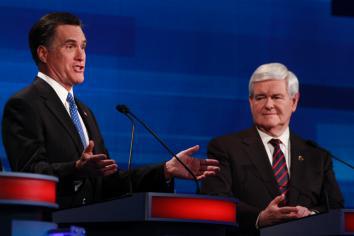
Photo by Charles Dharapa-Pool/Getty Images
The most overt recent attack on wealth in American politics took place in the 2012 Republican primaries—and it was smashed almost instantaneously by Democrats and Republicans alike. Newt Gingrich tried to frame Mitt Romney as a rapacious fat cat and was immediately denounced by his fellow Republicans. When the Obama campaign tried to pick up the charge, Bill Clinton stood up for Romney’s business career and made a broader claim about the wisdom of evaluating the morality of a person’s work. “I don’t think we ought to get into the position where we say this is bad work; this is good work,” said the former president. Cory Booker, who was planning to run for the Senate and therefore would have been primed to jump on the bash-the-rich bandwagon if it were a political winner, spoke out against the president’s campaign saying he should “stop attacking private equity.”
Why were high-profile Democrats defending Bain and private equity? Because they were raising a lot of money from people who worked at Bain Capital or companies like it. Obama outraised Romney in donations from Bain Capital and well outraised him in large individual contributions. As a whole, Congress is not only more dependent on the money of the 1 percent, it also looks more like them. For the first time in history a majority of Congress members are now millionaires.
Unlike the previous century, there is no ideology ready to carry the anti-wealthy crusade outside of the political context. There is no global socialist or communist revolution to attract American adherents or even a domestic agrarian revolution of the kind that fed the Populist Movement. “People 100 years ago thought they had an alternative,” says Gage. “There were these transformative social visions people really believed in. People thought they were headed into this terrifying or fabulous future and today what are those ideas?” Labor unions, once powerful institutions that maintained the class struggle when liberal candidates failed, are on the ropes.
Still, inequality continues to grow, the economic recovery is weak, and the public view is souring. Seventy-six percent now agrees with the statement that “the rich keep getting richer and the poor keep getting poorer.” On the left, Peter Beinart argues that the millennial generation might lead the next ideological revolution. Its members have suffered under a prolonged period of shrinking wages and falling benefits, and they believe in redistributive government action. The spirit of Occupy isn’t over, Beinart argues, it’s just sleeping. But before Tom Perkins starts nailing plywood over his windows, a lot more must happen. The movement still needs a leader, and if Hillary Clinton decides to run for president, it’s unlikely a liberal alternative will defeat her in a party where liberals, while on the rise, are still outnumbered by conservative and moderate Democrats.
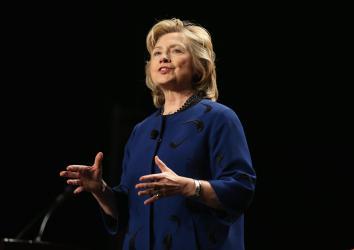
Photo by Joe Raedle/Getty Images
On the right, Ben Domenech has written about how libertarian populism is also becoming energized by today’s inequities. The target of that movement is not the wealthy in general, but the elites who profit from working the current system—the lobbyists, cronies, rent-seekers, union bosses, and overpaid school administrators. But Domenech’s solution isn’t more government but less of it. “The important thing is that this wealth (and power) is naturally determined (and checked!) by the market, instead of artificially determined by the state,” says Domenech. The challenge for this theory is that the rent-seekers and establishment powers in Republican politics have the money and the organizations to keep backing candidates who share their views. Plus, most Republicans would rather win after eight years of Barack Obama than back a revolution. It’s a lot to ask people who are hungering for certainty—or at least the illusion of certainty—to tear apart their party.
People’s frustration is going to find an outlet somewhere, but it’s not certain that it will be aimed at the wealthy. President Obama is a more likely scapegoat than rich people. Public dissatisfaction with Obama’s stewardship at home and abroad could simply lead to support for a Republican who promises to promote the opposite of all that Obama stood for. That fellow will be asking for a donation from you, too.
